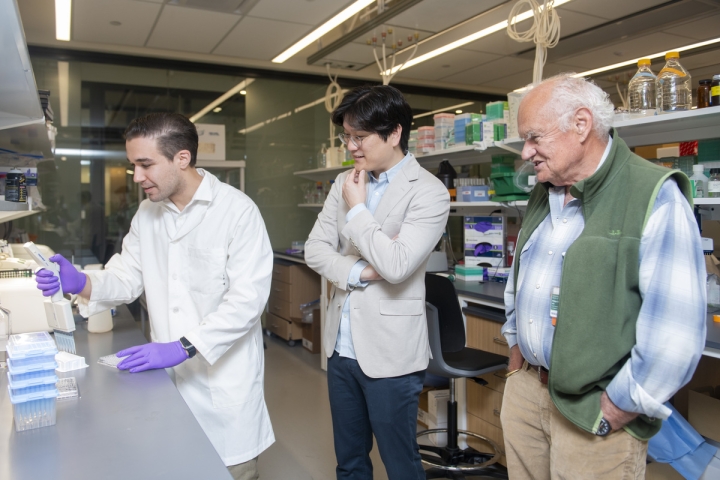The Dartmouth International Vaccine Initiative, an interdisciplinary initiative on vaccine research bringing together faculty from throughout Dartmouth and its professional schools, recently received a $1 million gift from the Jack and Dorothy Byrne Foundation.
“The donation has allowed DIVI to embark on a series of new multidisciplinary academic and research initiatives on campus in response to the strong faculty and student interest in vaccines we are now seeing,” says Ford von Reyn ’67, MED ’69, an infectious disease specialist and Geisel professor of medicine who led the development of the Dartmouth TB vaccine, DAR-901.
DIVI this month week will kick off a campus-wide bi-monthly vaccine seminar series. Sten Vermund, dean emeritus at the Yale School of Public Health, will deliver the inaugural talk on “Translational and Implementation Science: Examples from Vaccinology” on Oct. 8 at the Geisel School of Medicine.
DIVI has also entered into a collaboration with the UN-sanctioned International Vaccine Institute, a leading developer of vaccines for lower- and middle-income countries that is based in Seoul, South Korea. Discussions are underway on joint development of the Dartmouth TB vaccine, known as DAR-901, and on working in partnership to increase vaccine research capacity in Africa.
“This is an exciting time for vaccine research at Dartmouth,” says von Reyn, who co-chaired the first Dartmouth International Vaccine Conference in December last year, where he outlined the initiative’s vision for a distinctive multidisciplinary vaccine institute at Dartmouth. The daylong conference highlighted Dartmouth’s legacy in vaccine research as well as ongoing work by faculty members at Geisel, Thayer, Tuck, and Arts & Sciences.
Among other breakthroughs, research by Jason McLellan, then a Geisel professor, and his team at Dartmouth helped develop a method to stabilize coronavirus spike proteins for use as vaccine antigens, a crucial step in bringing lifesaving COVID-19 vaccines to market.
Since the 2023 conference, DIVI faculty members Christopher Snyder, the Joel Z. and Susan Hyatt Professor of Economics, and Kendall Hoyt, faculty director for the Dickey Global Health Initiative’s Pandemic Security Project and assistant professor of medicine at the Geisel School of Medicine, worked together to co-author a policy paper that identifies key design features that contributed to the success of Operation Warp Speed and how it can be a model for other major missions.
In a similar vein, Cody Meissner, a professor of pediatrics and medicine, co-authored a perspective piece earlier this summer on several lessons for preparedness and response stemming from the COVID-19 pandemic.
Meissner has served as a member of the National Vaccine Advisory Committee, the US Advisory Committee on Immunization Practices for the CDC, and is Chair of the Vaccine Injury Compensation Program for the Department of Health and Human Services. He is also a member of the FDA advisory committee responsible for advising the Agency on licensure of COVID-19 and other vaccines in development.
Another ongoing project is focused on developing a nasal spray vaccine for COVID-19. The lab of Peter Wright ’64, MED ’65, an infectious disease expert at Geisel, has long studied immunity in the respiratory and gastrointestinal tracts, often the body’s first line of defense against infection and an entirely different system when compared to antibodies or protection in the blood.
“We have good evidence that nasal and oral vaccines not only protect the individual but also protect others around them by preventing transmission,” says Wright.
Wright has also joined forces with Jiwon Lee, assistant professor of engineering at Thayer, to understand how one can develop broad immunity against influenza and work towards creating a flu vaccine that can provide protection against current and newly emergent influenza strains such as the H5N1. Such vaccines would have to be updated and administered less frequently as well.
More recently, the Advanced Research Projects Agency for Health, part of the U.S. Department of Health and Human Services, announced awards to support teams working to develop computational toolkits to design vaccines that target many viruses at once.
Margaret Ackerman, professor of engineering who conducts interdisciplinary research at the interface of biomedical and engineering sciences, and David Leib, professor of microbiology and immunology at Geisel, are part of different multi-institutional consortia that will each receive awards from the ARPA-H Antigens Predicted for Broad Viral Efficacy through Computational Experimentation program.
Their research groups are collaboratively using AI-guided antigen design to create novel vaccines against an array of human herpesviruses, including herpes simplex, cytomegalovirus, Epstein Barr virus and Kaposi’s sarcoma herpesvirus.
“The plan is very ambitious—to bring a vaccine to clinical trials within three years,” says Leib.
Ackerman, whose lab pioneers novel approaches to design vaccines against challenging pathogens like HIV, and her collaborators also received funding to test responses to new COVID vaccines.
“What DIVI has done, even in a kind of a formative way, is create all sorts of interesting and potentially powerful liaisons across Dartmouth,” says Wright. “The initiative unites researchers across disciplines to look broadly at vaccines and to think about how to turn vaccines into vaccination—how to get vaccines that are more readily useful, usable and inexpensive enough to be part of vaccine programs in poorer countries.”
The support for vaccine research comes as engineers and cancer researchers at Dartmouth are receiving up to $31 million from the Advanced Research Projects Agency for Health as part of the Biden Cancer Moonshot Initiative for their work in surgical image guidance.
